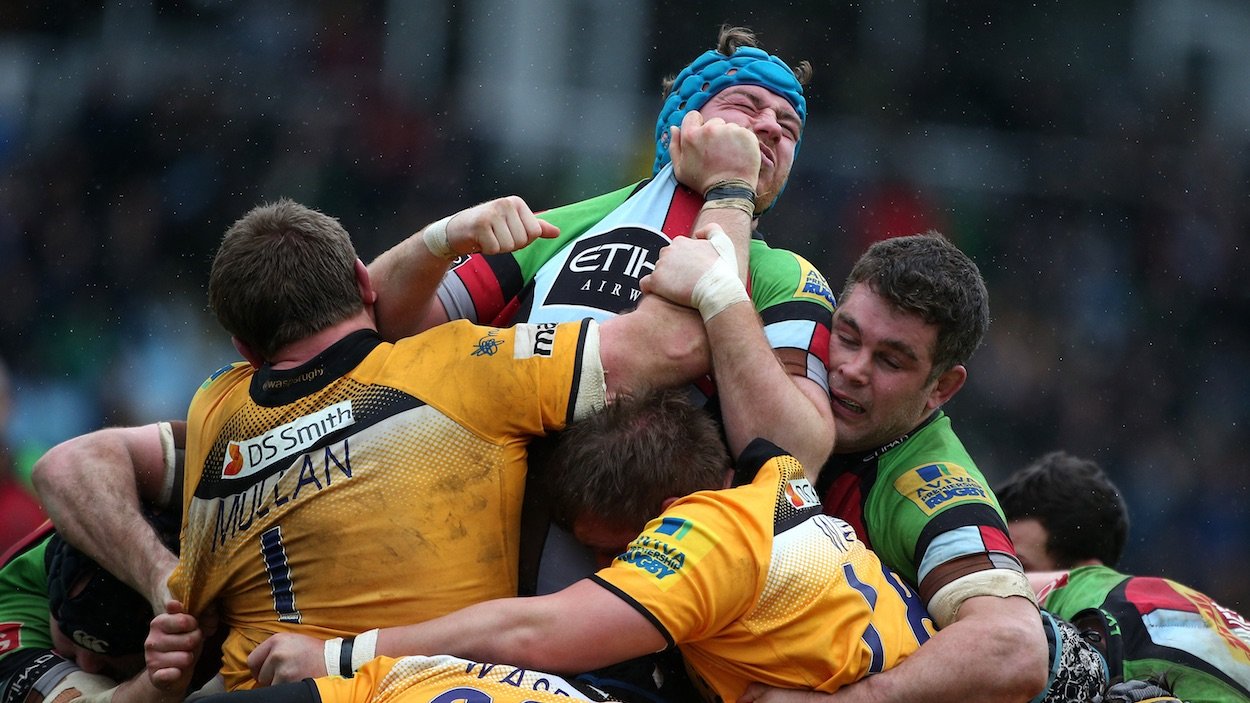Peter Bills: Premiership Talks A Big Game, Now Players Need To Deliver

The Aviva Premiership is claiming record viewing numbers this season, writes new Rugby Pass columnist Peter Bills, but the skills on display are all too often lacking compared to Southern Hemisphere competitions.
Now I know that all organisations, whether they be governments, rugby federations or tiddly winks societies, love to put a gloss on their activities.
These days, budget speeches by the financial controllers of most governments, take about a week to dissect. It’s only then you get to the small print and find out what is the actual truth.
Thus forewarned and forearmed, we should perhaps treat with care the viewing figures released proclaiming record TV audiences for the first weekend of England’s Aviva Premiership matches. ‘More than 1 million people watched the opening round of games’ the PR blurb gushed.
The opening Friday night match of the weekend programme, Gloucester v Leicester, attracted a rather humble 257,000 viewers on BT Sport. But then, the satellite channel is small fry compared to the likes of terrestrial television. UEFA, Europe’s soccer organisation, handed all its Champions League soccer rights to BT Sport for a king’s ransom and within 12 months was admitting it had made a mistake. The viewing figures were greatly disappointing.
If English club rugby were on the BBC it would attract way bigger audiences.
Never mind. The Commercial Director proclaimed with obvious excitement “These figures represent a fantastic start to the new season and shows (sic) the huge appeal of Aviva Premiership rugby worldwide.” Every single game, he went on, would be live on TV somewhere in the world. Indeed, the opening match was broadcast live on NBC in America for the first time.
[rugbypass-ad-banner id=”1473723660″]
Quite what the Yanks would have made of a frenetic sort of version of the Eton wall game played under uncertain floodlights at Gloucester rugby ground on a Friday night, is unknown. All I can report was the reaction to one English Premier League soccer match between Chelsea and a top opponent, I saw in a New York bar some years ago.
One of the locals, fumbling for a cigarette as he headed out of the place at full-time, shrugged and said to no-one in particular ‘So the Chelsea lose 4-1. Who gives a shit?’
Yes Sir!
As ever, behind the excited headlines, some relevant facts lurk. Club rugby in England is a game generally played at half pace compared to a tournament like Super Rugby. The vision of players frequently appears impaired, wrong options are taken with maddening consistency. Poor execution of basic skills is a given.
Any team’s progress into an opponent’s 22 is a signal for a mass pile-up of bodies either hurtling towards the white chalk of the goal line or trying to repel the invaders. It’s about as subtle as a sledgehammer cracking Christmas nuts. Far too often, it resembles dinosaur rugby.
But then, throughout the world in most of the rugby playing nations, there has been a general levelling down, not up, of standards. There is scarcely a scintilla of difference in the playing standards of countries like Wales, France, South Africa, Australia, Argentina, Ireland, Scotland, Japan, Samoa and Fiji. In most cases, any winner could emerge on a given day.
Right now, England are probably the best of the rest. But even their own coach, Australian Eddie Jones, concedes that the more he has watched the tapes of their 3-0 Test series win over the Wallabies in Australia in June, the more critical and less satisfied he has become.
For Jones knows one truth. New Zealand are comfortably clear of all rivals in the rugby world at this time. That’s not to say they’re unbeatable. But it is going to take a lot more skill than players chucking lobbed passes behind the ears of their mates and gleefully dying with the ball in broken play to upset the All Blacks.
If that is indeed the standard fare of Aviva Premiership rugby, and all too often sadly it is, then perhaps the tournament organisers and commercial officers might do better re-focusing their attention on the few moments of pure skill.
At least that way, the potential “huge appeal” of Aviva Premiership rugby could be explained to viewers.









































































